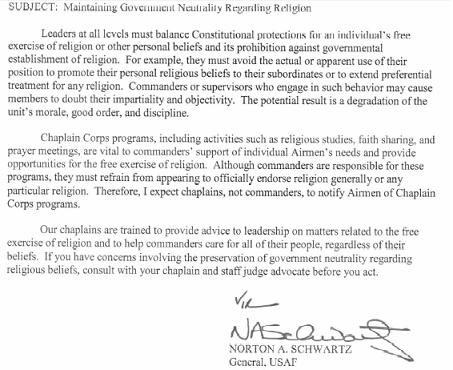Yesterday, Todd Starnes continued to make his case that the military is hostile to Christianity. He cited a couple of lawmakers who believe as he does and again cited the case of the Air Force officer who allegedly was asked to remove a Bible from his desk. Despite the fact that the Air Force issued a statement which indicates that religious materials may be visible on a desk, Starnes continues to focus only on information that supports his claims.
In his column, he repeated another inaccurate claim as indication that Mikey Weinstein of the Military Religious Freedom Foundation is behind what Starnes believes is military hostility to Christians.
The latest concerns came after Mikey Weinstein, head of the Military Religious Freedom Foundation met with military officials at the Pentagon about an instructional guide on religious tolerance.
I asked Lt. Cmdr. Nate Christensen about this claim and informed me that Weinstein has had no involvement in constructing an instructional guide. Air Force spokeswoman Lt. Col. Laurel Tingley confirmed it. If the Air Force issues such a guide, it will be based on a Air Force instruction 1-1 (read the instruction here). A brief summary of that instruction is restated in a memo written by Air Force General Norton Schwartz. The substance of that memo is below:

The essential point is that military leaders want religious programming to come from the chaplains and not from superior officers. The purposes of this policy are to avoid the appearance of religious favoritism and to prevent a hostile work environment.
The facts are there but Mr. Starnes’ readers are not getting all of them.
On a related matter, Starnes also referred to Coast Guard Rear Admiral William Lee’s comments on religious freedom. You can watch his speech here. While Lee’s remarks are delivered with real conviction, I wonder how the audience would have reacted if Lee was a member of the Unification Church. In his speech, Lee referred to a meeting with a young veteran who survived a suicide attempt. About this meeting, Lee said
…the rules say send him to the chaplain, my heart said, give this man a Bible.
While most evangelicals would resonate with Lee’s heart, would they applaud if Lee’s heart had said, give this man a copy of Sun Myung Moon’s Divine Principle? Or, in contrast, would they wish that a Unificationist superior officer direct the chaplains to provide advice in keeping with the young man’s own religious beliefs?
Personally, my values favor more freedom than less so I am not as bothered by allowing people to speak their minds. However, I understand the reasons for these regulations and see how they can be beneficial as a means of respecting the religious views of all service members. Agree with the regulations or not, Starnes should report the situation fairly and let his audience decide.